Jean Bedel Bokassa: "black Caligula" who imitated Napoleon
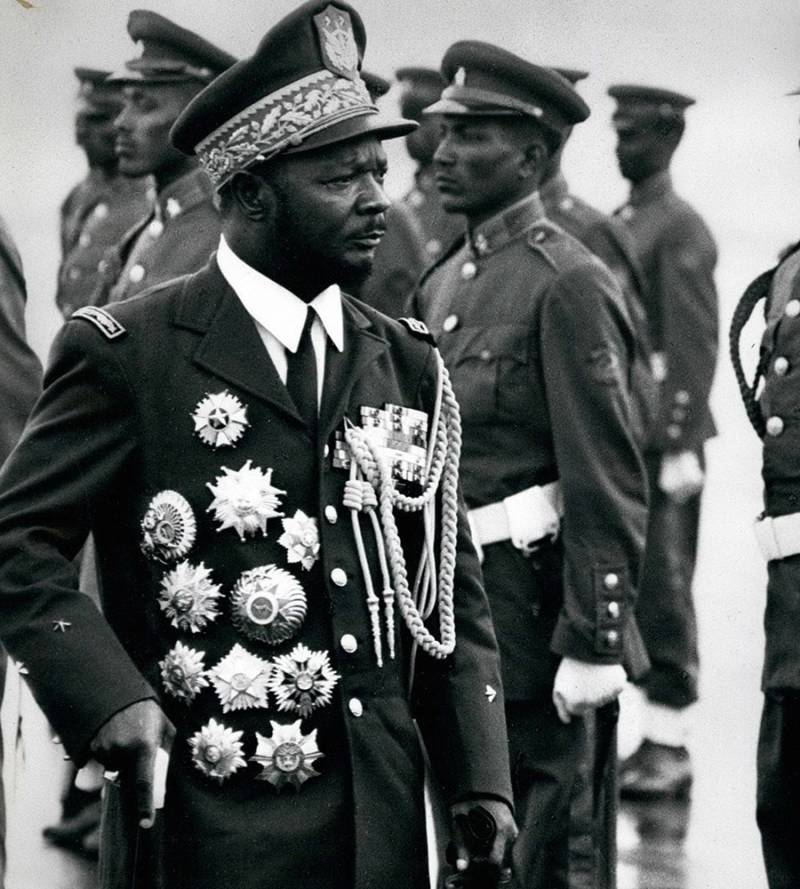
Jean Bedel Bokassa
For a long time, most African countries were colonies of European states. However, over time, the self-consciousness of the indigenous peoples grew, the struggle for independence expanded, and in the 1960s they received their long-awaited freedom. However, they could not use it to their advantage: colonialism was replaced by endless civil wars, internal instability and the power of cruel dictators. One such dictator was the president and then self-proclaimed emperor of the Central African Republic, Jean Bedel Bokassa, who was remembered for cruelty, cannibalism and many other eccentric antics.
The way to power
The future president and emperor, Jean Bedel Bokassa, was born in 1921 in the French colony of Ubangi-Shari, on the site of which the Central African Republic would be proclaimed almost 40 years later. He belonged to the Mbaka tribe, from which many officials came during the colonial period. The father of the future dictator was shot when Jean Bedel was 6 years old. The mother, who was left alone after that with 12 children in her arms, could not stand it and committed suicide. These events greatly affected the child's psyche and made a significant contribution to the formation of his personality.
Jean and his brothers and sisters were brought up by relatives, they gave him an education and prepared him for a career as a Catholic priest. But Bokassa himself decided otherwise: at the age of 18, he volunteered for the French colonial army. Probably, the fact that the idol of the young man was Napoleon Bonaparte, and he sought to imitate him in everything, played an important role here. Just at that time, and the year was 1939, the Second World War began. Bokassa took part in a number of battles, including the capture of Brazzaville, the landing of the allies in France in 1944, and the battles on the Rhine.
In 1949, Bokassa graduated from an officer's school in Senegal, and in 1950-1953. took part in another war - in Indochina. As his colleagues later recalled, the following incident happened to him there. Once Bokassa fought off his squad and got lost in the jungle. He was gone for more than a week, and when his colleagues finally found him, the following picture appeared before them: Bokassa sat in front of the fire and ate the remains of the Vietnamese partisan he had killed.
In 1960, Ubangi-Shari, along with a number of other colonies, gained independence and became known as the Central African Republic. Bokassa's cousin David Dako became the president of the new country.
By that time, Bokassa was a captain, but soon, thanks to an influential relative, his career took off sharply. In 1964, he became a colonel and chief of staff of the country's armed forces. In fact, now it was Bokassa who led the creation of the army of the republic. And this was the main mistake of the current president, David Dacko.
In 1965, a conflict arose between Bokassa and Dako. The colonel did not like that the president was creating alternative centers of power, such as the gendarmerie and personal security service. Dako was repeatedly reported that his relative was hostile and preparing a coup, but he did not take any action, apparently believing that his cousin would not overthrow him. But Bokassa thought otherwise.
On December 31, 1965, around midnight, soldiers loyal to Bokassa captured the presidential palace and other government buildings in the capital. Dako was arrested and placed under house arrest, but the head of the gendarmerie, Jean Isamo, whom Bokassa considered the main competitor, was sent to prison and was soon killed there. So Bokassa became the head of state.
Sole dictator
A few days after the coup, Bokassa dissolved parliament and repealed the constitution. He declared himself the only bearer of power in the country, and only one ruling party remained, headed by Bokassa.
The first thing he did after that, he destroyed all his obvious or potential opponents. The reprisals against them in most cases were public and distinguished by cruelty. So, the former head of the security service of President Dako, before being executed, was first crushed in his legs, then castrated, blinded, and only after that they cut off his head. There were rumors all over the country that there was a swimming pool with crocodiles in the palace of Bokassa, which the dictator feeds only on his opponents.
In foreign policy, Bokassa focused first on France and the capitalist countries. However, the French soon got tired of giving him loans, and relations between them deteriorated by the end of the 1960s. Bokassa decided to go over to their opponents - to the socialist camp.
In 1970, he visited the USSR, met with its leaders, in Artek he was even symbolically accepted as a pioneer. In Moscow, he liked Russian cuisine, and Bokassa asked to lend him a Soviet chef, who later worked for some time in his presidential palace. But one day the cook found parts of human bodies in the presidential refrigerator, and fled to the embassy in horror.
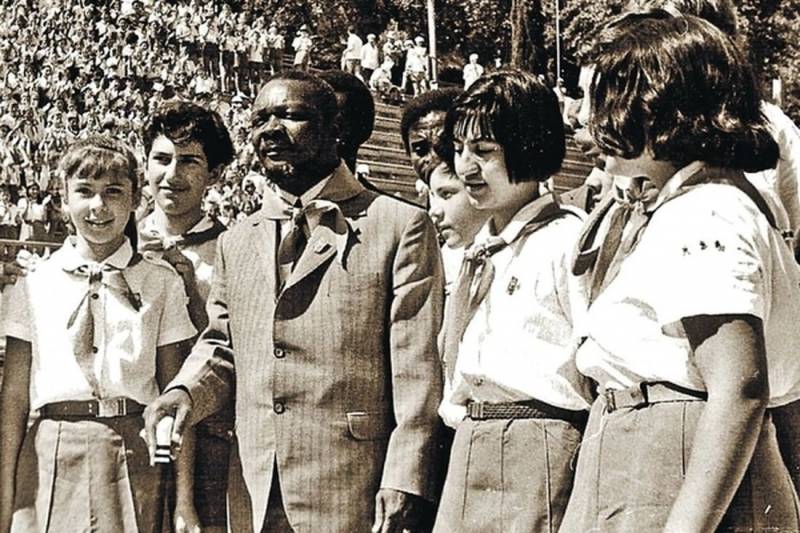
Bokassa in Artek
Subsequently, many media wrote about the cannibalism of Bokassa. It was alleged that he ate not only his political opponents, but also numerous mistresses, and once fed even his ministers with human flesh, which he told them at the end of dinner.
But they will write about this later, but for now, many world politicians did not disdain friendship with him. Bokassa was friends with Ceausescu, with politicians from China and North Korea. And when Giscard d'Estaing became president of France in 1974, he quickly found a common language with him. Giscard repeatedly came to the Central African Republic, hunted on the personal plantations of Bokassa.
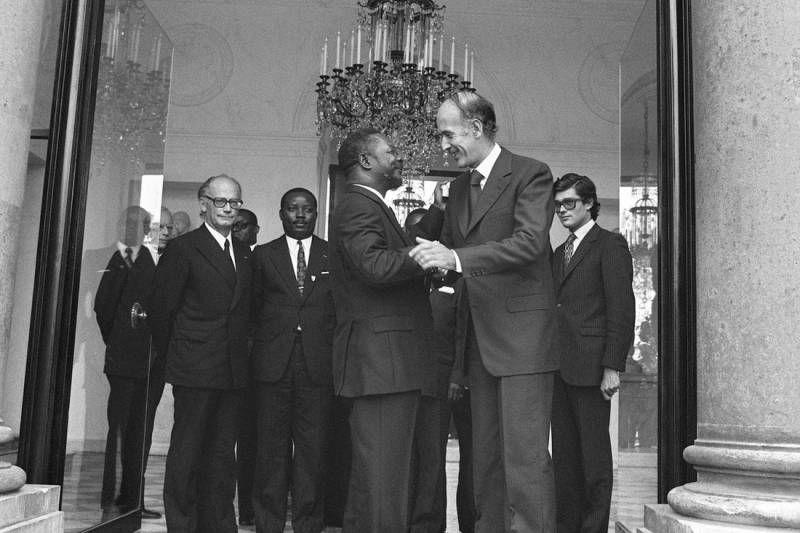
Bokassa and Giscard
Bokassa also developed good relations with the Libyan leader Muammar Gaddafi. In September 1976, Gaddafi visited Bangui, the capital of the CAR. On this occasion, Bokassa and his cabinet of ministers even converted to Islam. However, not for long - after only three months, Bokassa announced his return to Catholicism.
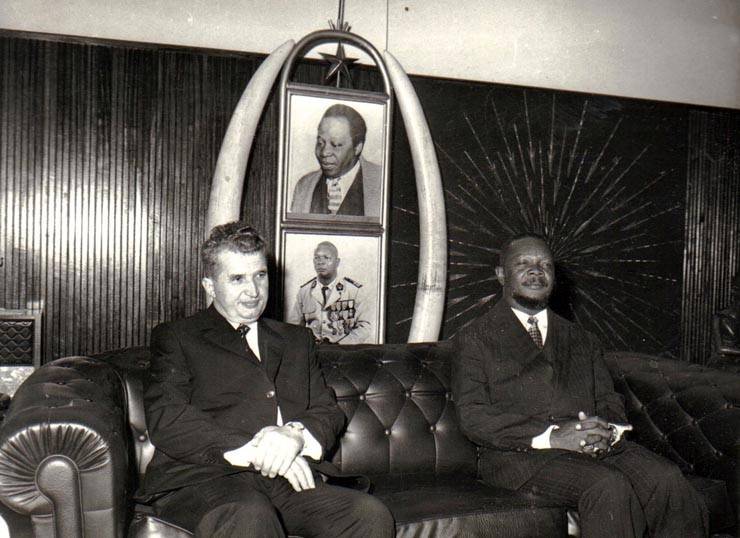
Meeting of Bokassa with Ceausescu in the Central African Republic. 1972
Central African Empire
As already mentioned, from a young age, the main idol of Bokassa was Napoleon Bonaparte. He tried to imitate him in everything. And, like his idol, in 1976 he proclaimed his state an empire, and himself an emperor. The coronation was scheduled for December 4, 1977.
On this occasion, a throne covered with gold, a crown studded with diamonds, a carriage trimmed with gold were ordered in France, and more than 100 cars and 130 horses were purchased. Invitations were sent out to the Pope and the presidents of many countries. However, none of them, including Bokassa's friends Giscard and Gaddafi, came to the coronation. But this did not prevent the holding of a solemn event, the total cost of which exceeded $ 20 million - at that time a quarter of the annual GDP of the Central African Republic.
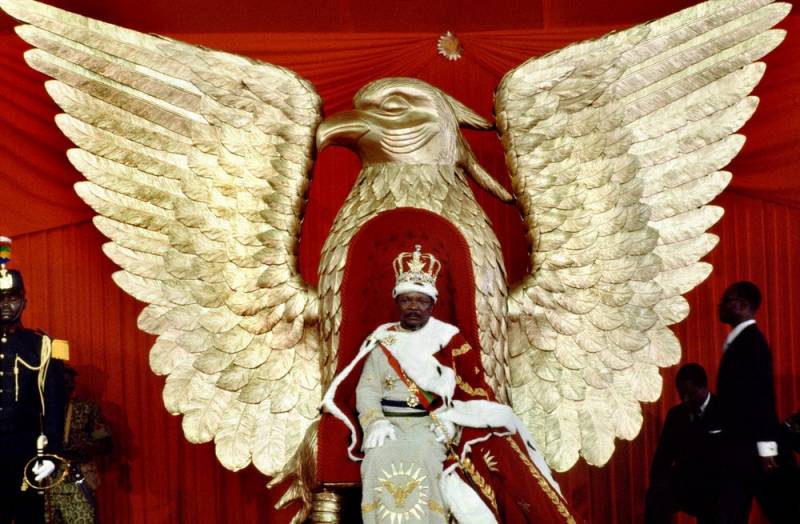
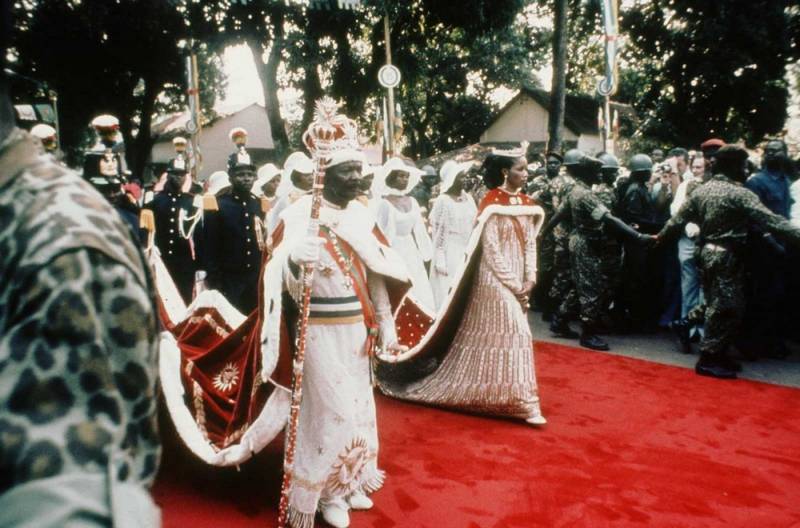
Coronation of Bokassa
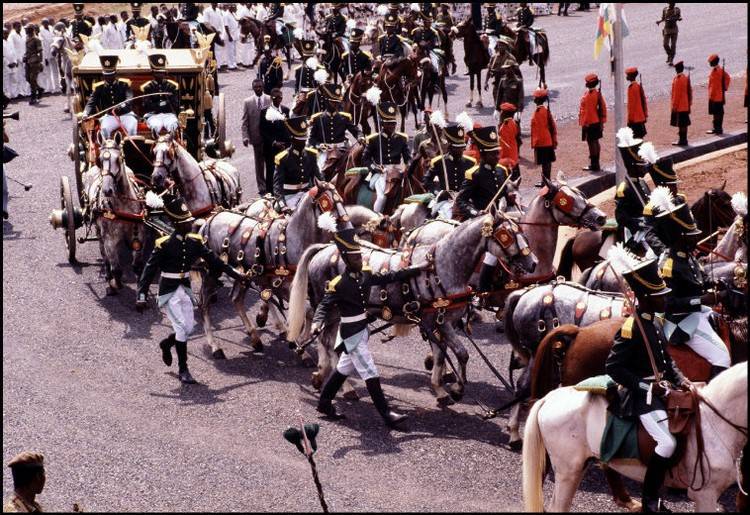
Uniforms and carriages are also an imitation of the Napoleonic era
The country, now called an empire, had been independent for 17 years, but continued to live as poorly as in the days of colonialism. The bulk of the population remained poor and disenfranchised, with only one doctor for every 43 inhabitants, while the total population exceeded 000 million. But all this did not prevent the self-proclaimed emperor, who now called himself Bokassa I, to throw away sums that even the leaders of richer states did not allow themselves to spend.
All over the world, this coronation was perceived as a laughing stock, another whim of a dictator who had lost touch with reality. Discontent was also growing among the people of the CAR itself.
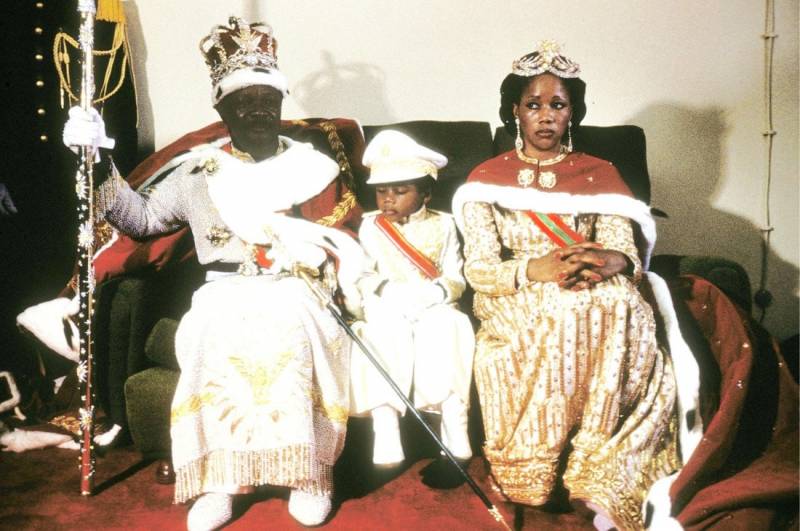
Bokassa with his elder wife and son. In total, he had 19 wives and 77 official children.
The end of the "emperor"
In January 1979, Bokassa issued a decree according to which all schoolchildren in the country were now required to wear expensive uniforms that were sewn at the "emperor's" personal factories. Since the population was poor, people simply did not have the money to buy this uniform. But the decree was not cancelled. Mass protests began, in April barricades were already being built in the capital and government buildings were stormed.
Bokassa ordered to open fire on schoolchildren and students, as a result of which more than 150 people died. Several hundred more protesters, most of whom were between the ages of 6 and 25, were arrested and jailed. In prisons they were tortured, often to death. French journalists wrote:
Soon the French embassy learned about all this. President Giscard decided to do away with the "emperor" that went beyond all limits.
In September of the same year, when Bokassa went on a visit to Libya, French special forces landed in Bangui by plane and almost bloodlessly captured all the government buildings of the capital. Nobody defended the crazed dictator, even his personal guard immediately laid down weapon. The French appointed David Dako, who was overthrown by Bokassa 13 years ago, as the new president of the Central African Republic.
Bokassa himself went into exile in France, where he lived for several years in a castle near Paris. It is obvious that over the years of being in power, he saved up enough money not only to buy the castle, but also to buy the loyalty of the French, who for some reason did not begin to bring the former dictator to justice, although his crimes were obvious.
Already after 7 years, a quiet and carefree life bored Bokassa. In 1986, the former dictator believed that the people of the Central African Republic were looking forward to his return, and he returned. Probably, here he also imitated his idol, who at one time returned from his first exile on the Elbe.
But Bokassa did not have his own "100 days". The CAR police arrested him right at the airport. A trial followed, initially handing down a death sentence to the former dictator. But then he was replaced with a life sentence. And in 1993, when the ruling regime in the country changed once again, Bokassa was completely amnestied. He died three years later in freedom.
Information